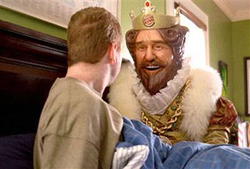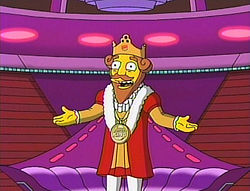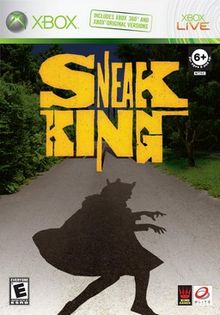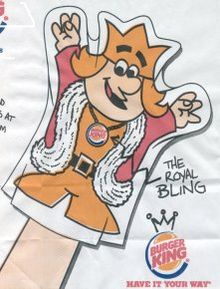- The Burger King
-
The Burger King 
The Burger King as seen in Burger King's Wake Up with the King commercialAgency: Crispin Porter + Bogusky Client: Burger King Title: Wake Up with the King Product(s): Whopper Product tie-in Enormous Omelet Sandwich Year: 2003-2011 The Burger King was a character created as the advertising mascot for the international fast-food restaurant franchise Burger King who became famous in numerous television commercials, including the Burger King Kingdom. The first iteration of the King was part of Burger King sign at the first store in Miami, Florida in 1955. Later signs had the King shown sitting on a "burger throne" as well as atop the BK sign while holding a beverage. In August 2011, Burger King announced that The Burger King would be retired as the primary mascot for the brand.[1]
Contents
History
1960s - 1980s
 The original Burger King as used in print campaigns in the 1960s
The original Burger King as used in print campaigns in the 1960s
 Second version of the original Burger King
Second version of the original Burger King
In the late 1960s to early 1970s Burger King started using a small, animated version of the King in its children's advertising where the animated Burger King was voiced by Allen Swift. The Burger King was featured in a series of advertisements in which he would visit a Burger King outlet for an interview with a television reporter or see a former court wizard who now worked for the chain. In all ads the King would present children with small gifts or buy them some Burger King food. Many of these commercials featured the king character reciting the restaurant's slogan, "Burger King, where kids are king".
By the late 70s, the original animated King was soon replaced by the "Marvelous Magical Burger King", a red-bearded, Tudor-era king who ruled the Burger King Kingdom and performed magic tricks that were mostly sleight-of-hand, but sometimes relied on camera tricks or involved his "Magic Ring" which could summon copious amounts of food. The King was accompanied by usually two or more children and notable characters such as "Sir Shake-a-Lot", the "Burger Thing" (a WC Fields-esque burger portrait), and "The Duke of Doubt" who often doubted the King's abilities, and the "Wizard of Fries" which resembled R2-D2 of Star Wars. This campaign paralleled McDonald's McDonaldland children's commercials, which featured "Ronald McDonald", "The Hamburglar", and "Mayor McCheese", along with other characters and mascots.
The children's ads featuring the King were phased out by the late 1980s in favor of the BK Kids Club Gang ads.
2003 - 2011
The Miami based advertising firm of Crispin Porter + Bogusky (CP+B) took over the advertising account of Burger King on January 27, 2003.[2] They began using a caricatured variation of the Burger King character from the Burger King Kingdom advertising campaign, now simply called "the King". An employee at Crispin Porter + Bogusky found a 1970s era, over sized King head for sale on eBay; originally used as an inspiration for brainstorming, it was eventually decided to restore the head and use it in a campaign.[3] This version of the King began appearing in commercials in 2004.[4] Employing the advertising technique called Viral Marketing, CP+B's ads generated significant word of mouth for its new use of what various trade publications and Internet articles labeled "the Creepy King" persona, an appellation that BK has come to favor and CP+B uses in its ads.[5] In this incarnation, "the King" is an actor who wears an over-sized, grinning mask that resembles the King. The ads feature the King appearing in various, random places, such as in bed with people or behind doors and walls, only to offer these people some sort of Burger King product. The ads have caught on with the public and The King has become very popular.
On the Internet, The King is something of an internet meme with jokes about his huge head, and frequently portrayed as a fiend with monstrous intents, often accompanied with the catchphrase "Where is your God now?".[6]
Due to sluggish sales and customer aversion, Burger King retired the 2000s version of the character in favor of a "food-centric" marketing approach.[4]
Advertising campaigns
The Burger King 
The King in a Simpsons / Burger King commercialAgency: Crispin, Porter + Bogusky Client: Burger King Title: The Simpson's Movie King Product(s): Product tie-in Year: 2007 - In October 2005, Burger King began to sell Halloween masks resembling The King and Burger King's viral marketing character The Subservient Chicken. There was little promotion on these masks, as Burger King's website[7] had no link to the bkmasks.com website and no commercials were aired advertising them. Nonetheless, the masks quickly sold out, and some masks were also sold on eBay for hundreds of dollars. In October 2006, the masks were again sold for the Halloween season. Unavailable for some time, the masks are now available again through Burger King's online shop.[8]
- Although the advertisements were mainly shown in North America, advertisements featuring the King surfaced on Channel 4 in the United Kingdom as well as in Germany in early January 2006. The King appeared not to catch on with the UK market and was seemingly retired there after only two brief commercials (featuring him at an ATM and as a pole dancer). However, he returned in summer 2006 as part of Burger King's Superman Returns campaign.
- In September 2006, Burger King began using the original animated King design from the late 1960s and early 1970s commercials on its cups, bags and in non tie-in kids advertising. The second generation King is portrayed as a sarcastic type who sometimes gets in trouble for his mischief making adventures, and appears as a simplistic hand puppet.
- In July 2007, The King appeared in several commercials promoting The Simpsons Movie as a Simpsons' character, complete with four fingers, yellow skin and an overbite.
- The ad campaign for the BK Homestyle Melt sandwiches depicted a group of women, presumably mothers, who have attempted to kill the King though various means such as putting a hit on him or attempting to run over him with a car. It is implied this is done because the new products are moving in on the women's territory, home cooked meals.
- The character has appeared in the tie-in promotion of the film Star Wars Episode III: Revenge of the Sith, commercials for a cross-promotions with the NFL and DirecTV's NFL Sunday Ticket sports subscription package.
- A further series of advertisements featuring Brooke Burke, which premiered during Super Bowl XL, featured the King orchestrating an elaborate Broadway-style show called "the Whopperettes": women dressed as burger condiments and toppings in a Ziegfeld Follies type production. The "Have it your way" slogan and "Creepy King" comment also made its way into the lyrics.
- In a 2007 commercial to promote the restaurant chain's new Western Whopper sandwich, the King is shown in full royal attire against an obviously fake backdrop of a Southwestern desert, doing a jig-like dance to banjo music. His head is slightly modified so that he wears a handlebar mustache in the style of the Old West, and is juxtaposed with shots of Burger King customers who, upon consuming a Western Whopper, acquire similar mustaches regardless of age or gender.
- In 2007, Burger King introduced a television advertising campaign in which a Burger King restaurant in Las Vegas, Nevada told customers that the company had stopped selling the Whopper sandwich. The ads showed the startled reactions of customers that Burger King would discontinue selling its most popular sandwich. A second round of related commercials showed actual customers who had ordered a Whopper instead being provided with a Big Mac from McDonald's or a hamburger from Wendy's. After the customers complained to the Burger King restaurant manager, the King would emerge from the kitchen with a Whopper on a silver platter. All of the commercials that aired featured excerpts from a full-length video which can be seen at the official "Whopper Freakout" website here [1].
- In a 2008 commercial, which takes place in the future, a retro-futuristic robot version of the Burger King delivers a new breakfast wrap to a person who is waking up. The purpose of the advertisement was to market Burger King's new Cheesy Bacon BK Wrapper.
- An animated version of the Burger King appears at the beginning of each episode of Seth MacFarlane's Cavalcade of Cartoon Comedy, bursting through the movie screen and trying to escape from some kind of danger behind him, such as angry jungle natives, a dramatic explosion, etc.
- In 2009 the Burger King advertises a Kid's Meal cross promotion with SpongeBob to the tune of "Baby Got Back" by Sir Mix-a-lot. The lyrics are replaced by references to SpongeBob SquarePants.
- The Kingons are used to advertise the 2009 Star Trek film. The advertising and related Kingon Defense Academy web site states that they are an illegitimate offspring between the King and a Klingon woman. The Kingons are a trio of two males and one female that all feature the plastic mask of the King modified with features of the later Klingons, namely head ridges and Fu Manchu mustaches on the two males and the King's crown on all three.
- In 2010, The King a second attempt was made to launch in the UK, with a series of TV and newspaper commercials, starting a few days before his launch, with sneak peeks accompanied by the tag "He's Coming".
NFL commercials
Beginning in 2005, commercials featuring The King were created by digitally altering classic NFL game footage. The King is superimposed over players, making it appear as though the King was involved in the play. Some of the players the King has been imposed over include Steve Young, Deion Sanders, and Moe Williams (receiving a lateral pass from Randy Moss). He has also been depicted performing the Lambeau Leap and dumping Gatorade on the head of former Miami Dolphins head coach Don Shula. These commercials were referenced on the ESPN program SportsCenter, when The King was facetiously dubbed an NFL Rookie Of The Year candidate (despite, as noted, the fact that he is shown playing for multiple teams).
In August 2006, a commercial debuted showing The King holding a press conference with his "agent", Drew Rosenhaus.
Advergaming
 Sneak King cover
Sneak King cover
The first appearance of The King in a video game was in the boxing game Fight Night Round 3 from EA Sports which was released on all-formats, starting with the Xbox 360 release in February 2006.[9] The King was available as the in-ring round guy, and later he was selectable as your boxing manager (his speciality was giving you "Heart"). There were also persistent rumors that he could be played as a boxer using a cheat code. However, some fans of the game regard his cameo as an example of excessive product placement.[10]
In October 2006, Burger King announced that it would be releasing three video games for the Xbox and Xbox 360 consoles, starring The King and other mascots, such as the Subservient Chicken. In Pocketbike Racer, the mascots face off in a minibike race. Big Bumpin' has them trying to defeat each other in a game of bumper cars. Finally, Sneak King has players control the Burger King in a third-person perspective stealth game, where the King must sneak up behind hungry people and offer them Burger King products. Players are graded on how elaborately they deliver the food.
The games were available at Burger King restaurants from November 19 to December 24, 2006. They were priced at $3.99 each ($4.99 Canadian) with purchase of a value meal, and have each been rated "E for Everyone" by the ESRB.[11] While the games are now unavailable in stores, Burger King is still selling the games through its online store. Although Dollarama is now selling them for $2.00 each.[12] The games remain priced at $3.99 each, but they are now available as a set for $10.99. All three received low ratings from various game critics.[13][14][15]
The newest gaming venture is a series of games that are developed by Seattle, Washington based mobile content provider Mobliss. The games, designed to run on mobile phones, are promoted in U.S. locations on menus and packaging and were introduced spring of 2008.[16] According to Mobliss, the goal of the first game is to become the King's protégé by facing challenges and progressing in the virtual world of a Burger King-themed city.[17] The games can be purchased and downloaded using an SMS shortcode, and can be available on all major US carriers as Mobliss has direct publishing agreements with Sprint Nextel, AT&T Mobility, Verizon Wireless, Alltel, and T-Mobile (USA).[10]
See also
References
- ^ Cohen, Zachary (8 August 2011). "Burger King Dethrones Its Creepy 'King' Mascot". TIME. http://newsfeed.time.com/2011/08/20/burger-king-dethrones-its-creepy-king-mascot/. Retrieved 22 August 2011.
- ^ PRNewswire (23 January 2006). "Burger King Corporation Selects Crispin Porter + Bogusky As Lead Creative Advertising Agency". HispanicBusiness.com. http://www.hispanicbusiness.com/news/2004/1/22/burger_king_corporation_selects_crispin_porter.htm.
- ^ Seth Stevenson (2004-10-01). "Burger King is resurrecting a dubious icon. Why?". Slate.com. http://www.slate.com/id/2107697/. Retrieved 2007-10-09.
- ^ a b "The (Burger) King Is Dead". Time magazine. September 9, 2011. page 56.
- ^ "Big Burger Business: McDonald's and Burger King". Heavyweights. Food Network. 2008-04-21. No. 3, season 2.
- ^ Aaron Peckham (2007-10-01). Mo' Urban Dictionary. Andrews McMeel Publishing. ISBN 0740768751. http://www.urbandictionary.com/define.php?term=where%20is%20your%20god%20now. Retrieved 2009-01-10. "A common phrase tagged onto an image or web page so terrifyingly weird that it makes you question if god exists. Most often seen associated with the rubber-faced Burger King mascot."
- ^ Burger King Corporate Web Page
- ^ Burger King Masks at the Burger King online Store[dead link]
- ^ Michael Donahue, "Forced Guests: Cameos that make us sceam 'Yessss!'" in Electronic Gaming Monthly 226 (March 2008): 34.
- ^ a b Fred Aun (2007-10-08). "Burger King Makes Foray into Mobile Phone Gaming". ClickZ. http://www.clickz.com/3627232. Retrieved 2007-10-09.
- ^ Brendan Sinclair (2006-10-02). "Burger King orders up Xbox games". Gamespot. http://www.gamespot.com/news/6159158.html?tag=lastword;link. Retrieved 2007-10-08.
- ^ The Burger King shop Games page[dead link]
- ^ Sneak King isn't a good game, but it's so crazy and so cheap that it still manages to be weirdly compelling. Gamespot review of Sneak King
- ^ Pocketbike Racer is a bad kart-racing game that's often broken. Gamespot review of Pocketbike Racer
- ^ Big Bumpin' might have worked as a part of a large minigame collection, but on its own, it's sort of lame. Gamespot review of Big Bumpin'
- ^ Bill Ray (2007-10-08). "Do you want a high-score with that?". The Register. http://www.theregister.co.uk/2007/10/08/burger_king_mobiles/. Retrieved 2007-10-08.
- ^ Mark Hefflinger (2007-10-08). "Burger King Taps Mobliss to Develop Mobile Games". Digital Media Wire. http://www.dmwmedia.com/news/2007/10/05/burger-king-taps-mobliss-to-develop-mobile-games. Retrieved 2007-10-08.
External links
- RetroJunk.com A 1985 Burger King Kingdom commercial featuring the Burger King and the Duke of Doubt on Retro Junk.
- TV Acres.com The evolution of The Burger King
Categories:- Burger King advertising
- Burger King characters
- Corporate mascots
- Fictional kings
- Internet memes
- 1955 introductions
Wikimedia Foundation. 2010.

